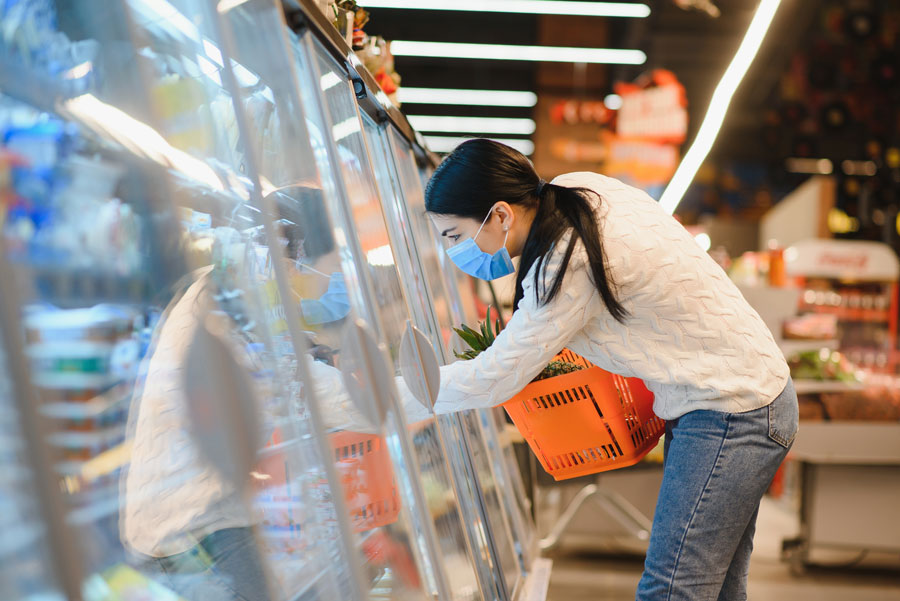
Luis R. Burset / Gaither International
Even before the pandemic, Puerto Rico has been experiencing an economic and demographic evolution. Beginning with the 2017 hurricanes, and aggravated by the COVID-19 pandemic, the people and their consumption patterns experienced changes, significant in many instances. Following is a brief snapshot of the current Puerto Rican market, based on Gaither´s proprietary data combined with other from governmental agencies.
Population and consumer economy
While the steep population decline in recent years seems to have diminished in 2019, the aging phenomenon continues. On one hand, the population level has benefited from return-migrants during the COVID months. Up to September 2020, the passenger entry/exit movement through Luis Muñoz Marín airport was 21,000 fewer arriving passengers. For comparison purpose, for the same period, the deficit was 20,000 in 2019 and 107,000 in 2018. On the other hand, a reduced number of births, coupled with a stable annual death level (approximately 30,000) account for the increase of the median age to 43.2 years, one of the highest in the U.S. and Latin America.
The availability of Supplemental Nutrition Assistance Program (SNAP) funds at higher levels per family, and to more families, has positively impacted food store sales. During the pandemic crisis, more funds were released, and more families were approved into the program (1.5 million individuals in 832,000 families), accounting for 40% of grocery sales. Per the Chamber of Food Marketing, Industry & Distribution’s (MIDA, by its Spanish acronym) research, this has impacted families’ average monthly expenses (+18%) and the number of monthly visits to a food store (+33%). On a negative note, a key consideration when evaluating purchase patterns is that 28% of the Puerto Rican working population has seen its income affected, with 17% losing its jobs, and 11% having working hours reduced.
Purchase habits
The mandatory lockdown prompted the adoption of new purchase channels and habits that have remained after more lenient preventive measures were implemented. Shopping apps are being utilized for supermarkets and restaurants, either formal, informal or quick service (fast foods). Per Gaither’s MBP Daily Tracking Study, 10% of shoppers use an app or website to order their groceries.
As for pick-up versus delivery, whether to save time or money, Puerto Ricans prefer to pick-up their groceries, as well as prepared and unprepared food: 25% vs. 16% for food stores; 43% vs. 26% in quick service restaurants (QSR´s). Increased utilization of QSR´s drive-thru (currently at 70%) could be a temporary habit, considering consumers would be able to enter restaurants’ eating areas in the future.
As experienced after Hurricane Maria, the intention of purchasing an automobile – new or used – has increased considerably since April, reaching 14% in November 2020 (the historical average is 6%). This intention is validated with an increase in visits to auto dealers, which reached 24%.
Brands
The early bird catches the pray. In the QSR category, those chains that adapted earlier to customers’ new needs saw their transactions grow. As for users of the new digital purchase channels, 47% of shoppers have tried new brands, and 11% have adopted them permanently. Thus, presence in the digital market is key.
Sources:
Gaither Media Brand Profiles Daily Tracking Study
Gaither’s Post-Covid Online Purchase Behavior Study
Bureau of Transportation Statistics; September 2020 Report
MIDA 2020 Radiografía del Consumidor
Banco Popular of Puerto Rico (“Popular”) is not affiliated nor related to the individuals or entities mentioned in this article. This article is for informative purposes only, and does not constitute an endorsement or guarantee of its accuracy. Neither Popular nor any of its affiliates, subsidiaries, or related entities are, nor might be held liable for any special, direct, or indirect, damages, resulting from reliance on the information contained in this article, which Popular did not prepare. Popular provides financial services) and does not provide the type of service referenced in this article. If you need any related service, you should request the advice of the competent professional of your preference.
 Luis R. Burset / Gaither International
Even before the pandemic, Puerto Rico has been experiencing an economic and demographic evolution. Beginning with the 2017 hurricanes, and aggravated by the COVID-19 pandemic, the people and their consumption patterns experienced changes, significant in many instances. Following is a brief snapshot of the current Puerto Rican market, based on Gaither´s proprietary data combined with other from governmental agencies.
Luis R. Burset / Gaither International
Even before the pandemic, Puerto Rico has been experiencing an economic and demographic evolution. Beginning with the 2017 hurricanes, and aggravated by the COVID-19 pandemic, the people and their consumption patterns experienced changes, significant in many instances. Following is a brief snapshot of the current Puerto Rican market, based on Gaither´s proprietary data combined with other from governmental agencies.


